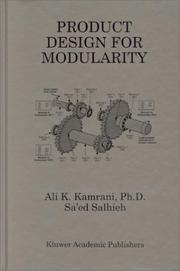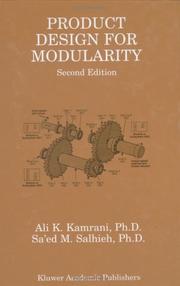| Listing 1 - 10 of 22 | << page >> |
Sort by
|
Book
ISBN: 1787432807 Year: 2017 Publisher: [Place of publication not identified] : Emerald Publishing Limited,
Abstract | Keywords | Export | Availability | Bookmark
 Loading...
Loading...Choose an application
- Reference Manager
- EndNote
- RefWorks (Direct export to RefWorks)
Book
ISBN: 9789176857410 Year: 2016 Publisher: Linkopings Universitet
Abstract | Keywords | Export | Availability | Bookmark
 Loading...
Loading...Choose an application
- Reference Manager
- EndNote
- RefWorks (Direct export to RefWorks)
This thesis by Torbjörn Andersson explores the concept of aesthetic flexibility in the context of modular product development and brand management. It investigates how modular strategies affect the visual appearance and design processes of complex product portfolios. Through five studies, the research examines the constraints and possibilities of managing visual coherence and diversity within branded products. It introduces four aesthetic flexibility strategies and a model illustrating how portfolio extension strategies influence design aesthetics. The work aims to advance the understanding of product design's visual aspects for professionals, academics, and students in industrial design and engineering.
Book
ISBN: 3658301015 Year: 2020 Publisher: Wiesbaden, Germany : Springer Fachmedien Wiesbaden GmbH,
Abstract | Keywords | Export | Availability | Bookmark
 Loading...
Loading...Choose an application
- Reference Manager
- EndNote
- RefWorks (Direct export to RefWorks)
In der klassischen Ökonomik ist in der Regel der statische Gleichgewichtszustand einer einfachen Wirtschaft der zentrale Betrachtungsgegenstand. Mit dem Simulationsprogramm EconSim entwickelt der Autor ein Modell, das es Ökonomen ermöglichen soll, deutlich komplexere Abbilder realer Wirtschaften zu erschaffen und diese konsistent und systematisch zu analysieren. Dabei ist der zentrale Gedanke die Schaffung eines möglichst modularen Werkzeugs, das es erlaubt eine große Vielzahl verschiedener Situationen und Zusammenhänge abzubilden und jederzeit weitere Elemente hinzuzufügen. Janis Kesten-Kühne analysiert wesentliche ökonomische Merkmale von Marktprozessen für bestimmte Marktvermittlungsformen und stellt sie entsprechenden Ergebnissen standardökonomischer Gleichgewichtsmodelle gegenüber. Der verfolgte Ansatz des Autors ist ein wichtiger Beitrag zur ökonomischen Forschung. Der Inhalt Theoretische Grundlagen Modellbildung Semantische Mächtigkeit Simulationsstudien Die Zielgruppen Dozent*innen und Student*innen der Wirtschaftswissenschaften, Wirtschaftsinformatik, Informatik Fach- und Führungskräfte mit Bezug zu Angewandter BWL in Richtung strategisches Management und Entscheidungsunterstützung Der Autor Janis Kesten-Kühne hat Maschinenbau und Wirtschaftsingenieurwesen an der TU Clausthal studiert. Anschließend promovierte er am Lehrstuhl für Volkswirtschaftslehre am Institut für Wirtschaftswissenschaft der TU Clausthal und ist dort derzeit als Postdoc tätig.
Multiagent systems. --- Modularity (Engineering) --- Economics --- Psychological aspects.

Abstract | Keywords | Export | Availability | Bookmark
 Loading...
Loading...Choose an application
- Reference Manager
- EndNote
- RefWorks (Direct export to RefWorks)
Flexible manufacturing systems --- Industrial design --- Modularity (Engineering) --- Product design

Abstract | Keywords | Export | Availability | Bookmark
 Loading...
Loading...Choose an application
- Reference Manager
- EndNote
- RefWorks (Direct export to RefWorks)
Flexible manufacturing systems --- Industrial design --- Modularity (Engineering) --- Product design
Book
ISBN: 0323854214 0323854222 9780323854221 9780323854214 Year: 2022 Publisher: Amsterdam, Netherlands : Elsevier,
Abstract | Keywords | Export | Availability | Bookmark
 Loading...
Loading...Choose an application
- Reference Manager
- EndNote
- RefWorks (Direct export to RefWorks)
"Modular Treatment Approach for Drinking Water and Wastewater is a comprehensive resource that explores the latest studies and techniques in the field of treating water. It offers a new approach to tackling the demand for a high-quality, economic and green water treatment system and providing clean water globally. This book focuses on a modular strategy, which allows for a customized retrofit solution to the constantly changing parameters that are dependent on current demand and requirements."--
Drinking water --- Water --- Purification. --- Effluent treatment --- Purification of water --- Water purification --- Water treatment --- Sanitation --- Water quality management --- Water-supply --- Purification of drinking water --- Modularity {Engineering) --- Modularity (Engineering)

ISBN: 0792381750 Year: 1998 Publisher: Boston (Mass.) : Kluwer academic,
Abstract | Keywords | Export | Availability | Bookmark
 Loading...
Loading...Choose an application
- Reference Manager
- EndNote
- RefWorks (Direct export to RefWorks)

ISBN: 0970539401 Year: 2001 Publisher: Los Angeles VhdlCohen publ.
Abstract | Keywords | Export | Availability | Bookmark
 Loading...
Loading...Choose an application
- Reference Manager
- EndNote
- RefWorks (Direct export to RefWorks)
Book
Abstract | Keywords | Export | Availability | Bookmark
 Loading...
Loading...Choose an application
- Reference Manager
- EndNote
- RefWorks (Direct export to RefWorks)
We live in a dynamic economic and commercial world, surrounded by objects of remarkable complexity and power. In many industries, changes in products and technologies have brought with them new kinds of firms and forms of organization. We are discovering news ways of structuring work, of bringing buyers and sellers together, and of creating and using market information. Although our fast-moving economy often seems to be outside of our influence or control, human beings create the things that create the market forces. Devices, software programs, production processes, contracts, firms, and markets are all the fruit of purposeful action: they are designed. Using the computer industry as an example, Carliss Y. Baldwin and Kim B. Clark develop a powerful theory of design and industrial evolution. They argue that the industry has experienced previously unimaginable levels of innovation and growth because it embraced the concept of modularity, building complex products from smaller subsystems that can be designed independently yet function together as a whole. Modularity freed designers to experiment with different approaches, as long as they obeyed the established design rules. Drawing upon the literatures of industrial organization, real options, and computer architecture, the authors provide insight into the forces of change that drive today's economy.
Electronic digital computers --- Modularity (Engineering) --- Computer industry --- Industrial organization. --- Design and construction --- History.

Abstract | Keywords | Export | Availability | Bookmark
 Loading...
Loading...Choose an application
- Reference Manager
- EndNote
- RefWorks (Direct export to RefWorks)
| Listing 1 - 10 of 22 | << page >> |
Sort by
|

 Search
Search Feedback
Feedback About UniCat
About UniCat  Help
Help News
News